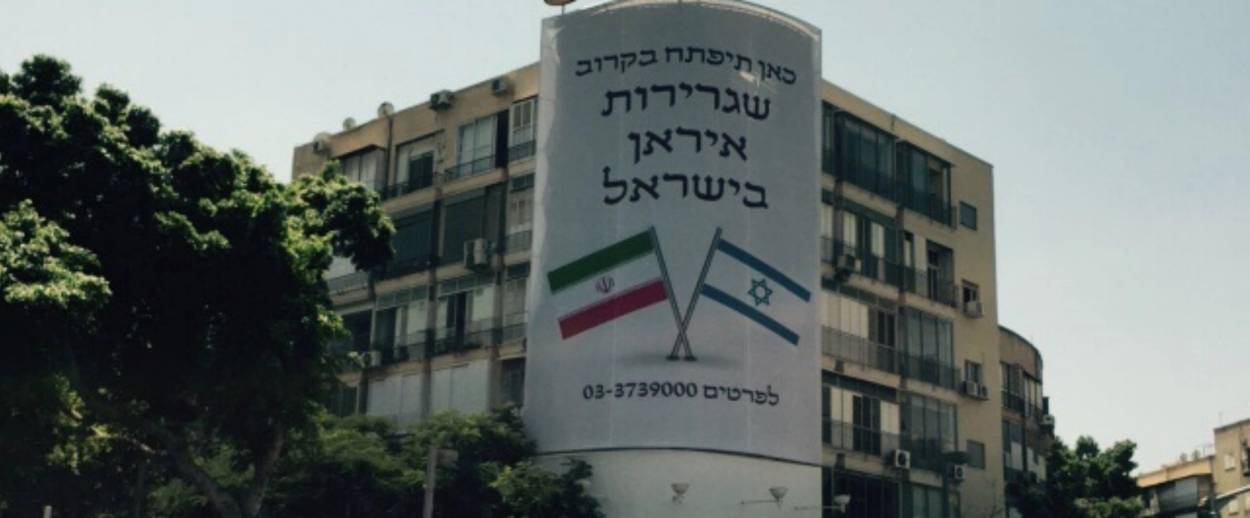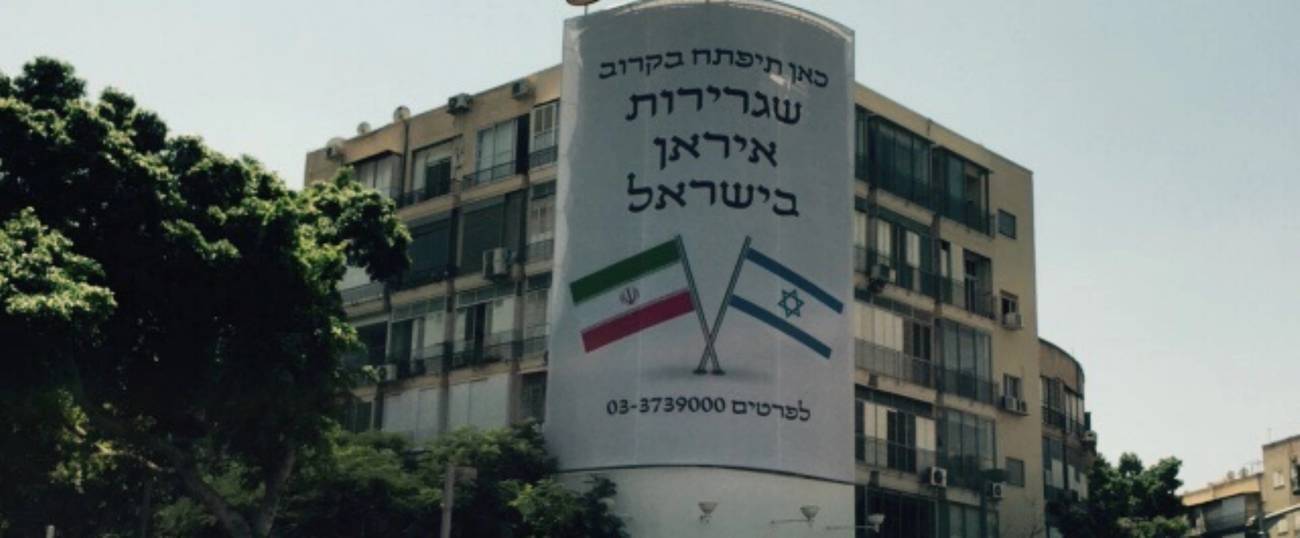No, Iran Is Not Opening an Embassy in Tel Aviv
Contrary to the message of an unusual PR campaign for the new film ‘Atomic Falafel.’




Until very recently, there was a five-story-tall billboard emblazoned with the Iranian and Israeli flags, smack in the middle of Tel Aviv. The billboard claimed that an Iranian embassy would soon open right there, on that very spot, just outside Rabin Square.
When I first saw this billboard a couple weeks ago, through the window of a taxi, I thought that that I must be dreaming. After the Iranian Revolution of 1979, Ayatollah Khomeini declared Israel The Little Satan (the United States is The Great Satan, of course) and broke off all diplomatic relations with the country. An Iranian embassy in Tel Aviv would be virtually impossible.
I had just gotten back from a trip abroad, and at first I assumed that the redeye flight must have gotten the better of me. Then I thought that maybe, while I was shopping and visiting parks and museums with limited Wi-Fi access and no TV, something momentous had happened—say, a complete realignment of Middle East politics and a near-miraculous total peace accord.
No such luck. After hearing speculation that the billboard was an art installation or a peace campaign, I found out that it was something more mundane: a publicity stunt. The billboard turns out to have been a teaser for the new Israeli comedy Atomic Falafel, which comes out in Israel on September 10th. Many international media outlets have discussed the marketing campaign, including BBC Persian Television, which broadcasted a five-minute-long segment about the film and the stunt.
This madcap pro-peace comedy is about a scary subject: nuclear conflict between Iran and Israel. A woman from a small Israeli town, who works in a fast-food stand selling falafel to soldiers, finds herself the object of the affections of a German nuclear inspector.
The town where the woman lives happens to have a nuclear power plant. Meanwhile, her daughter has made an online connection with an Iranian girl who lives in a town that also has a nuclear power plant. Before long, the woman and her daughter are in trouble with the IDF, which is about to launch a preemptive strike on Iran’s nuclear facilities.
The film’s producer, Avraham Pirchi, calls it “a satirical comedy mocking ultra-militarism.” The film was written and directed by Dror Shaul, whose semi-autobiographical film Sweet Mud, set on a kibbutz, won a 2007 Sundance World Cinema Jury Prize. Shaul is also known in Israel for his 1999 cult-comedy Mivtza Savta (“Operation Grandma”).
Atomic Falafel has co-producers in Germany and New Zealand. Shaul hoped to co-produce the film with an Iranian production company, too. That didn’t work out. He’s still angling to distribute the film in Iran, though (which, frankly, seems far-fetched).
“In making this movie I wanted to deliver the message that the technological revolution of the internet and social media succeeded in crossing over the black curtain that dark regimes put up in order to isolate citizens of different countries,” said Shaul in the film’s press release. “Teenagers around the world today are much more similar to each other than different. They dress the same, listen to the same music and are not really interested in wars. I hope that the sane side of Israel and the world will overcome the irresponsible one, and that my little boy, born two weeks after the end of shooting the film, will have a safe future.”
The film’s release couldn’t be timelier. “When we started to make Atomic Falafel, we didn’t know we would be releasing the film when Iran’s nuclear power would be so relevant, but that’s what’s happened,” Pirchi told the Times of Israel.
Even though the intention behind the Tel Aviv billboard was to catch people’s eyes and raise eyebrows—a mission in which it was undoubtedly successful—this fantasy of a world in which an Iranian embassy actually could open in Israel is one that Shaul and Pirchi obviously share. And just as the Cold War spawned Stanley Kubrick’s Dr. Strangelove, now Israel has its own nuclear-satirical-comedy.
Dana Kessler has written for Maariv, Haaretz, Yediot Aharonot, and other Israeli publications. She is based in Tel Aviv.